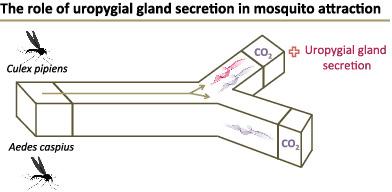当前位置:
X-MOL 学术
›
Med. Vet. Entomol.
›
论文详情
Our official English website, www.x-mol.net, welcomes your
feedback! (Note: you will need to create a separate account there.)
House sparrow uropygial gland secretions do not attract ornithophilic nor mammophilic mosquitoes.
Medical and Veterinary Entomology ( IF 1.6 ) Pub Date : 2019-08-14 , DOI: 10.1111/mve.12401 A Díez-Fernández 1 , J Martínez-de la Puente 1, 2 , L Gangoso 1 , M Ferraguti 1 , R Soriguer 1, 2 , J Figuerola 1, 2
Medical and Veterinary Entomology ( IF 1.6 ) Pub Date : 2019-08-14 , DOI: 10.1111/mve.12401 A Díez-Fernández 1 , J Martínez-de la Puente 1, 2 , L Gangoso 1 , M Ferraguti 1 , R Soriguer 1, 2 , J Figuerola 1, 2
Affiliation

|
Mosquito feeding preferences determine host-vector contact rates and represent a key factor in the transmission of vector-borne pathogens. The semiochemical compounds of which vertebrate odours are composed probably play a role in mosquito host choice. Birds spread secretions from uropygial gland over their feathers to protect their plumage, comprising behaviour that may in turn affect odour profiles. Although uropygial secretions are expected to modify the attractiveness of birds to mosquitoes, contradictory findings have been reported. Mosquito species differ in their feeding preferences, with some species feeding mainly on birds (ornithophilic species) and others on mammals (mammophilic species). Consequently, it is possible that ornithophilic and mammophilic species differ in their response to uropygial gland secretions. Using a dual-choice olfactometer, the present study tests this hypothesis by comparing the behavioural response to uropygial gland secretions from juvenile male and female house sparrows (Passer domesticus) in the ornithophilic Culex pipiens and the mammophilic Aedes (Ochlerotatus) caspius mosquitoes. No differences were found in the response of either mosquito species to the uropygial gland secretions. Therefore, the preference of ornithophilic mosquitoes for avian hosts is apparently not explained by a greater attraction of mosquitoes to the uropygial gland secretion odour when presented in combination with a CO2 -enriched airflow.
中文翻译:

麻雀的尿g腺分泌物不会吸引嗜鸟或嗜哺乳动物的蚊子。
蚊虫的摄食偏好决定了宿主与载体的接触率,并代表了媒介传播病原体传播的关键因素。构成脊椎动物气味的信息素化合物可能在蚊子宿主选择中起作用。鸟类将尿道腺的分泌物散布在羽毛上,以保护其羽毛,其行为可能反过来影响气味。尽管尿py分泌物有望改变鸟类对蚊子的吸引力,但据报道矛盾的发现。蚊子的摄食方式不同,有些蚊子主要以鸟类(嗜嗜性物种)为食,另一些物种以哺乳动物(嗜乳性物种)为食。因此,嗜鸟和嗜乳物种对尿道腺分泌物的反应可能不同。本研究使用双选择嗅觉仪,通过比较嗜嗜性淡色库蚊和成年伊蚊(Ochlerotatus)的Caspius蚊子对雄性和雌性麻雀(Passer domesticus)的尿道腺分泌物的行为反应来检验这一假设。两种蚊子对尿道腺分泌物的反应均未发现差异。因此,当与富含CO2的空气流组合使用时,蚊子对尿道腺分泌气味的更大吸引力显然不能解释嗜嗜性鸟类对鸟类宿主的偏爱。本研究通过比较嗜食性淡色库蚊和哺乳伊蚊(Ochlerotatus)的蚊子对幼年雌性和麻雀(Passer domesticus)的尿道腺分泌物的行为反应来检验这一假设。两种蚊子对尿道腺分泌物的反应均未发现差异。因此,当与富含CO2的空气流组合使用时,蚊子对尿道腺分泌气味的更大吸引力显然不能解释嗜嗜性鸟类对鸟类宿主的偏爱。本研究通过比较嗜食性淡色库蚊和哺乳伊蚊(Ochlerotatus)的蚊子对幼年雌性和麻雀(Passer domesticus)的尿道腺分泌物的行为反应来检验这一假设。两种蚊子对尿道腺分泌物的反应均未发现差异。因此,当与富含CO2的空气流组合使用时,蚊子对尿道腺分泌气味的更大吸引力显然不能解释嗜嗜性鸟类对鸟类宿主的偏爱。
更新日期:2019-08-14
中文翻译:

麻雀的尿g腺分泌物不会吸引嗜鸟或嗜哺乳动物的蚊子。
蚊虫的摄食偏好决定了宿主与载体的接触率,并代表了媒介传播病原体传播的关键因素。构成脊椎动物气味的信息素化合物可能在蚊子宿主选择中起作用。鸟类将尿道腺的分泌物散布在羽毛上,以保护其羽毛,其行为可能反过来影响气味。尽管尿py分泌物有望改变鸟类对蚊子的吸引力,但据报道矛盾的发现。蚊子的摄食方式不同,有些蚊子主要以鸟类(嗜嗜性物种)为食,另一些物种以哺乳动物(嗜乳性物种)为食。因此,嗜鸟和嗜乳物种对尿道腺分泌物的反应可能不同。本研究使用双选择嗅觉仪,通过比较嗜嗜性淡色库蚊和成年伊蚊(Ochlerotatus)的Caspius蚊子对雄性和雌性麻雀(Passer domesticus)的尿道腺分泌物的行为反应来检验这一假设。两种蚊子对尿道腺分泌物的反应均未发现差异。因此,当与富含CO2的空气流组合使用时,蚊子对尿道腺分泌气味的更大吸引力显然不能解释嗜嗜性鸟类对鸟类宿主的偏爱。本研究通过比较嗜食性淡色库蚊和哺乳伊蚊(Ochlerotatus)的蚊子对幼年雌性和麻雀(Passer domesticus)的尿道腺分泌物的行为反应来检验这一假设。两种蚊子对尿道腺分泌物的反应均未发现差异。因此,当与富含CO2的空气流组合使用时,蚊子对尿道腺分泌气味的更大吸引力显然不能解释嗜嗜性鸟类对鸟类宿主的偏爱。本研究通过比较嗜食性淡色库蚊和哺乳伊蚊(Ochlerotatus)的蚊子对幼年雌性和麻雀(Passer domesticus)的尿道腺分泌物的行为反应来检验这一假设。两种蚊子对尿道腺分泌物的反应均未发现差异。因此,当与富含CO2的空气流组合使用时,蚊子对尿道腺分泌气味的更大吸引力显然不能解释嗜嗜性鸟类对鸟类宿主的偏爱。











































 京公网安备 11010802027423号
京公网安备 11010802027423号